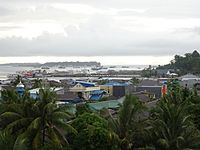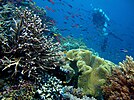Eastern Indonesia
Eastern Indonesia | |
|---|---|
| Indonesia Timur (in Indonesian) | |
|
From upper-left to lower-right: Diving experience in Piaynemo Island of Raja Ampat, Clitoria ternatea (the native flower of Ternate Island), Papuan man wearing traditional Papuan attires, Papeda (the staple food of Eastern Indonesia) | |
 Eastern Region of Indonesia | |
| Largest city | Jayapura |
| Provinces | |
| Demonym | Eastern Indonesians[1] |
| Time zone | UTC+9 (Eastern Indonesia Time) |
Eastern Indonesia (or East Indonesia)[2] is one of the three main geographical regions of Indonesia, the other two being Western Indonesia and Central Indonesia.[3] Eastern Indonesia spans across the Banda and Maluku Seas in the west, the Arafura and Timor Seas in the south, and the Halmahera Sea in the north. It comprises the archipelagic territory of Tanimbar, Banda, Maluku,[4] Halmahera, Raja Ampat, Biak, and western New Guinea. Eastern Indonesia Time is the national standard time designated for Eastern Indonesia; it falls within the UTC+9 time zone.
Eastern Indonesia borders Southern Philippines in the northwest, Palau in the north, Western Papua New Guinea in the east, and Northern Australia in the south.
History and background
During the last stages of the Dutch colonial era, the area east of Java and Kalimantan was known as the Great East and later known as Eastern Indonesia. On 24 December 1946, the State of East Indonesia was formed covering the same area (excluding Western New Guinea). It was a component of the United States of Indonesia, and was dissolved into the unitary Republic of Indonesia in 17 August 1950.[5] Currently, Eastern Indonesia consists of 17 provinces: Bali, East Nusa Tenggara, West Nusa Tenggara, Central Sulawesi, Gorontalo, North Sulawesi, South Sulawesi, Southeast Sulawesi, West Sulawesi, Maluku, North Maluku, Central Papua, Highland Papua, Papua, South Papua, Southwest Papua, and West Papua.[6][7][8]
Geography
Climate
In Eastern Indonesia, the days are generally dry and sunny from October through March with the warm tropical rain season occurring between May and August; temperatures are typically in the 27 °C (81 °F) to 30 °C (86 °F) range throughout the year.[4]
Administration
Administratively, Eastern Indonesia consists of two main geographical units, namely the Maluku Islands and Papua (Western New Guinea).
| ISO 3166-2 Codes | Geographical unit | Provinces | Population (mid-2022)[9] |
Largest city | Highest point |
|---|---|---|---|---|---|
ID-ML
|
Maluku Islands | Maluku and North Maluku | 3,201,000 | Ambon | Mount Binaiya 3,027 m (9,931 ft) |
ID-PP
|
Papua | Central Papua, Highland Papua, Papua, South Papua, Southwest Papua, and West Papua | 5,601,900 | Jayapura | Puncak Jaya 4,884 m (16,024 ft) |
Economy
Seaweed farming has traditionally been a common commercial activity along the coasts of Eastern Indonesia; however, in the 2020s climate change in Indonesia has been causing seaweed farmers in Eastern Indonesia to lose revenue and harvests.[10] In the consumer shopping industry, Eastern Indonesia experienced a rapid increase in online shopping in the 2020s, with overall transactions in the region doubling from 2020 to 2021; this growth has been led by Indonesian e-commerce company Tokopedia, with the top product types sold in the region being health and beauty, fashion, food and beverage, and electronics.[3]
Demographics
Largest cities
The following are the four largest cities in Eastern Indonesia by population:
| No. | City | Province | Population | Image |
|---|---|---|---|---|
| 1. | Kupang | East Nusa Tenggara | 442.758 | 
|
| 2. | Jayapura | Papua | 398.478 | 
|
| 3. | Ambon | Maluku | 347.288 | 
|
| 4. | Sorong | Southwest Papua | 284.410 | 
|
See also
References
- ^ Williams, Catharina Purwani (2007). Maiden Voyages: Eastern Indonesian Women on the Move. Netherlands: Koninklijk Instituut voor Taal-, Land- en Volkenkunde (KITLV) Press. p. 211. ISBN 9789812303943.
- ^ "President Jokowi: East Indonesia Will Be Able to Expand Rapidly, Need Supported by Infrastructure". Cabinet Secretariat of the Republic of Indonesia. 2015.
- ^ a b Paramitha, Pradna (December 29, 2021). "Western, central, and eastern Indonesia show diverse trends in online shopping behavior". Jakarta: The Jakarta Post. Retrieved November 6, 2023.
- ^ a b Lonne, Torben (March 23, 2018). "Essential guide to remote travel in eastern Indonesia". The Jakarta Post. Jakarta. Retrieved November 6, 2023.
- ^ Ricklefs 2008, pp. 362, 374.
- ^ Media, Kompas Cyber (6 March 2012). "13 Provinsi di Indonesia Timur Gelar Konsultasi Regional - Kompas.com".
- ^ Agency, ANTARA News. "BI Catat Bali Raih Inflasi Terendah KTI - ANTARA News Bali".
- ^ "Bawaslu Siap Kelola Keuangan Pilkada 2018 Secara Akuntabel - Badan Pengawas Pemilihan Umum Republik Indonesia". bawaslu.go.id.
- ^ Badan Pusat Statistik, Jakarta, 2023.
- ^ Barends, Jaya (July 23, 2023). "Seaweed farmers in eastern Indonesia struggle in a changing climate". Mongabay. West Seram. Retrieved November 6, 2023.
- ^ Nusa Tenggara
- ^ Maluku
- ^ Western Papua
Bibliography
- Wouden, F.A.E. Van (1935). Types Of Social Structure In Eastern Indonesia (in English and Indonesian). Leiden: Springer Netherlands. p. 189. ISBN 9789401510769.
- Fraassen, C. F. van (1976). Drie plaatsnamen uit Oost-Indonesië in de Nagara-Kertagama: Galiyao, Muar en Wwanin en de vroege handelsgeschiedenis van de Ambonse eilanden [Three place names from Eastern Indonesia in the Nagara-Kertagama: Galiyao, Muar and Wwanin and the early trade history of the Ambon Islands] (in Dutch). doi:10.1163/22134379-90002645.
- Andaya, Leonard Y. (1993). The World of Maluku: Eastern Indonesia in the Early Modern Period. Honolulu: University of Hawaii Press. p. 306.
- Williams, Catharina Purwani (2007). Maiden Voyages: Eastern Indonesian Women on the Move. Netherlands: Koninklijk Instituut voor Taal-, Land- en Volkenkunde (KITLV) Press. p. 211. ISBN 9789812303943.
- Ricklefs, M. C. (2008). A History of Modern Indonesia Since C.1200. Macmillan Education UK. ISBN 978-0-230-54686-8.
External links
- "Banda Neira, Paradise in Eastern Indonesia". Ministry of Foreign Affairs Republic of Indonesia. 2021.



